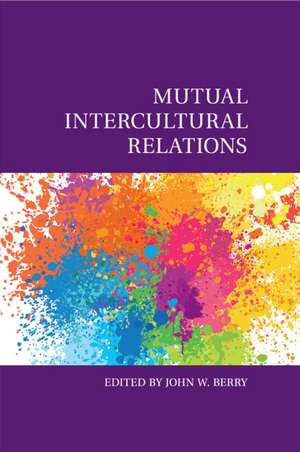Mutual Intercultural Relations: Culture and Psychology
Editat de John W. Berryen Limba Engleză Paperback – 18 sep 2019
Din seria Culture and Psychology
-
 Preț: 207.44 lei
Preț: 207.44 lei -
 Preț: 284.78 lei
Preț: 284.78 lei -
 Preț: 331.66 lei
Preț: 331.66 lei -
 Preț: 316.28 lei
Preț: 316.28 lei - 11%
 Preț: 447.69 lei
Preț: 447.69 lei -
 Preț: 329.32 lei
Preț: 329.32 lei -
 Preț: 293.55 lei
Preț: 293.55 lei -
 Preț: 246.42 lei
Preț: 246.42 lei -
 Preț: 283.63 lei
Preț: 283.63 lei -
 Preț: 320.93 lei
Preț: 320.93 lei -
 Preț: 280.74 lei
Preț: 280.74 lei
Preț: 356.91 lei
Nou
Puncte Express: 535
Preț estimativ în valută:
68.30€ • 74.17$ • 57.37£
68.30€ • 74.17$ • 57.37£
Carte tipărită la comandă
Livrare economică 22 aprilie-06 mai
Preluare comenzi: 021 569.72.76
Specificații
ISBN-13: 9781316635230
ISBN-10: 1316635236
Pagini: 452
Ilustrații: 17 b/w illus. 61 tables
Dimensiuni: 151 x 229 x 22 mm
Greutate: 0.6 kg
Editura: Cambridge University Press
Colecția Cambridge University Press
Seria Culture and Psychology
Locul publicării:Cambridge, United Kingdom
ISBN-10: 1316635236
Pagini: 452
Ilustrații: 17 b/w illus. 61 tables
Dimensiuni: 151 x 229 x 22 mm
Greutate: 0.6 kg
Editura: Cambridge University Press
Colecția Cambridge University Press
Seria Culture and Psychology
Locul publicării:Cambridge, United Kingdom
Cuprins
1. Introduction John W. Berry; 2. Intercultural relations in Russia Nadezhda Lebedeva, Victoria Galyapina, Zarina Lepshokova and Tatiana Ryabichenko; 3. Intercultural relations in Latvia and Azerbaijan Nadezhda Lebedeva, Alexander Tatarko and Victoria Galyapina; 4. Intercultural relations in Estonia Raivo Vetik, Maaris Raudsepp, Jüri Kruusvall, Larissa Kus-Harbord, Marianna Makarova and Aune Valk; 5. Intercultural relations in Finland Asteria Brylka, Inga Jasinskaja-Lahti and Tuuli Anna Mähönen; 6. Intercultural relations in Norway David L. Sam, Raivo Vetik, Marianna Makarova and Maaris Raudsepp; 7. Intercultural relations in Germany Katja Hanke, Marieke C. van Egmond, Anette Rohmann and Klaus Boehnke; 8. Intercultural relations in Switzerland Andrea U. Haenni Hoti, S. Heinzmann, M. Müller, A. Buholzer and R. Künzle; 9. Intercultural relations in Greece Vassilis Pavlopoulos and Frosso Motti-Stefanidi; 10. Intercultural relations in Italy Cristiano Inguglia, Pasquale Musso and Alida Lo Coco; 11. Intercultural relations in Malta Gordon Sammut and Maryanne Lauri; 12. Intercultural relations in Portugal Felix Neto and Joana Neto; 13. Intercultural relations in Spain Hector Grad; 14. Intercultural relations in India R. C. Mishra, S. Bano and R. C. Tripathi; 15. Intercultural relations in Hong Kong Algae Kit Yee Au, Bryant Pui Hung Hui and Sylvia Xiaohua Chen; 16. Intercultural relations in Australia Justine Dandy, Kevin Dunn, Jolanda Jetten, Yin Paradies, Lena Robinson and Tahereh Ziaian; 17. Intercultural relations in Canada Saba Safdar, Gui Yongxia, R. C. Annis, R. Gibson and John W. Berry; 18. Evaluation of the hypotheses and conclusions John W. Berry.
Recenzii
'This book offers a remarkable collection of contributions focussed on the critical issue of intercultural relations within multiethnic societies. Relations between dominant majorities and ethnic minorities are empirically compared across seventeen societies characterized on the basis of their cultural diversity and integration policies. Collaborators in each setting empirically tested the multiculturalism, contact and integration hypotheses resulting in a fascinating and intellectually stimulating book that sets the stage for the next decade of research in the field.' Richard Y. Bourhis, Emeritus Professor, Université du Québec à Montréal
'The contemporary geopolitical world will embrace this important book. The underlying theme is 'How shall we all live together?' The substantial Mutual Intercultural Relations project, reported herein, combines the experience of John W. Berry, a renowned expert in this area, and the enthusiastic cooperation of scholars in seventeen pluralistic societies.' Walter J. Lonner, Western Washington University
'A unique compendium of psychological theory and research on acculturation and intercultural relations that examines the process and outcomes of intercultural contact - not only in terms of mutual and reciprocal perspectives, but also across a wide range of economic and socio-political contexts. Spanning sixteen countries, this impressive collection offers practical insights into 'cultures in contact' and provides a valuable resource for researchers in the field.' Colleen Ward, Victoria University, Wellington
'The contemporary geopolitical world will embrace this important book. The underlying theme is 'How shall we all live together?' The substantial Mutual Intercultural Relations project, reported herein, combines the experience of John W. Berry, a renowned expert in this area, and the enthusiastic cooperation of scholars in seventeen pluralistic societies.' Walter J. Lonner, Western Washington University
'A unique compendium of psychological theory and research on acculturation and intercultural relations that examines the process and outcomes of intercultural contact - not only in terms of mutual and reciprocal perspectives, but also across a wide range of economic and socio-political contexts. Spanning sixteen countries, this impressive collection offers practical insights into 'cultures in contact' and provides a valuable resource for researchers in the field.' Colleen Ward, Victoria University, Wellington
Descriere
By examining intercultural relations in seventeen societies, this book answers the fundamental question: 'how shall we all live together?'
